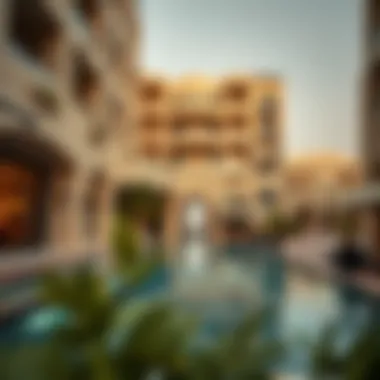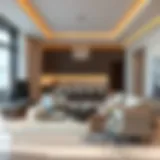Navigating Dubai's Boutique Real Estate Market


Intro
Dubai's real estate scene is like a dazzling tapestry, woven with distinct threads of opportunity, style, and luxury. At the heart of this metropolis, the boutique real estate sector stands out, presenting a unique charm that appeals to both investors and homeowners alike. This sector, characterized by its smaller scale and personalized offerings, reflects a shift in buyer preferences towards properties that offer more than just four walls.
As the city continues to grow and evolve, understanding the dynamics of this boutique market is pivotal. This article seeks to dissect not only the current landscape but also to shine a light on market trends, investment opportunities, and the lifestyle factors shaping buyer decisions. With a myriad of options available, discerning stakeholders can navigate with insight and strategy, ensuring they make informed choices in this vibrant landscape.
In the following sections, we will explore where the boutique real estate sector is headed, what unique factors set it apart, and how various elements intertwine to create a distinct narrative in Dubai's property market.
Get comfortable as we delve into the intricate layers of this alluring sector and uncover the nuances that make it a vital part of Dubai's real estate tapestry.
Preface to Boutique Real Estate
The concept of boutique real estate has carved out a distinctive niche within the broader market landscape. It refers not just to luxury properties but to a unique class of real estate tailored to meet the needs and tastes of discerning buyers. In a city like Dubai, known for its skyscrapers and extravagant living, boutique properties present an alternative that emphasizes individuality and personal touch. This guide will elaborate on the features that set boutique real estate apart, delving into why it's gaining traction among investors and homeowners alike.
To fully appreciate this sector, one must understand how boutique properties differ from conventional real estate offerings. They offer a combination of distinctive design, personalized services, and exclusivity that appeals to a specific market segment. Engaging with this topic allows stakeholders to not only grasp the unique qualities of boutique real estate but also its implications on the investment landscape.
For instance, the rise of boutique real estate in Dubai can significantly influence buyer preferences, affecting everything from pricing strategies to architectural trends in the burgeoning real estate market. Furthermore, understanding these dynamics can empower investors and homebuyers to make informed decisions in an ever-evolving sector.
Defining Boutique Real Estate
Boutique real estate may seem like a buzzword, but it encapsulates a range of essential characteristics that distinguish it from larger, mass-market properties. The term often refers to residential or commercial spaces that focus on unique architectural features and tailored services. Unlike cookie-cutter developments, boutique properties often boast a smaller scale, allowing for a more personal touch. They may be located in sought-after areas, boasting an aesthetic that resonates with specific lifestyle choices.
Key Characteristics of Boutique Real Estate:
- Tailored Design: Each boutique property usually comes with distinct architectural elements, setting it apart from conventional designs.
- Personalized Service: Often, these properties provide concierge services, ensuring that residents enjoy bespoke experiences.
- Exclusive Neighborhoods: They are typically situated in areas that are not only desirable but also provide a certain cachet.
With these qualities in mind, the allure of boutique real estate lies in its ability to offer a lifestyle that blends luxury with individuality. Investors looking for diversification in their portfolios will find that these properties can provide both aesthetic and financial rewards.
The Emergence of Boutique Properties in Dubai
Dubai's skyline is a testament to architectural innovation and grandiosity, yet a quieter revolution is underway—the emergence of boutique properties. In recent years, a noticeable shift has occurred where buyers are no longer merely drawn to the opulent towers but are increasingly seeking unique living experiences.
This trend can be attributed to several factors:
- Cultural Shift: As the demographics of Dubai evolve, more people are seeking homes that resonate with their identities and lifestyles, favoring boutique properties that reflect personal taste over uniformity.
- Increased Demand: The demand for upscale living environments has risen, creating a fertile ground for boutique developments that respond to this desire for exclusivity.
- Market Diversification: Investors are recognizing the potential for boutique properties to cater to niche markets, presenting opportunities for high returns.
"In a market dominated by larger developments, boutique properties have emerged as a breath of fresh air, offering character, style, and exclusivity in a city known for its extravagance."
Consequently, it is clear that the emergence of boutique properties in Dubai is not a mere trend but a significant shift in real estate dynamics. Both buyers and investors are beginning to appreciate the profound implications of this change, considering how it reshapes the landscape for years to come.
Characteristics of Boutique Properties
The boutique real estate sector thrives on uniqueness, both in style and substance. Within the marketplace, the characteristics of boutique properties manifest in ways that distinctly set them apart from traditional real estate offerings. This distinction is essential for potential buyers and investors to understand, as it reveals not only the allure of boutique developments but also the strategic advantages they can provide. Through a closer examination of their architectural design, aesthetic value, location, and accessibility, we can better appreciate what makes boutique properties so compelling.
Architectural Design and Aesthetic Value
Unique Architectural Features
When it comes to boutique properties, architectural design is pivotal. It often showcases a signature style that speaks to individuality and creativity. For instance, many boutique buildings feature distinctively modern designs with organic, flowing shapes and innovative material use—think glass, steel, and sustainable materials that harmonize with the environment. Not only does this approach stand out aesthetically, but it also promotes eco-friendliness.
A notable characteristic here is the attention to detail, which can be seen in layouts, landscaping, and exterior finishes. Each element is intentionally crafted to enhance visual impact and personal connection. This emphasis on unique features makes boutique homes appealing for discerning buyers who seek something beyond the mundane.


However, the benefits come with considerations. Unique designs can sometimes be costly to construct and maintain, and the resale value can be unpredictable. These properties may appeal largely to niche markets, and if trends change, they could potentially become less desirable.
Interior Design Trends
Interior design trends in boutique properties often lean towards the artistic, reflecting current styles while integrating elements that evoke comfort and luxury. When you step inside a boutique space, you may be greeted by open floor plans with high ceilings, ample natural light, and refined touches like bespoke cabinetry or artisanal tile work—details that convey both sophistication and warmth.
Popular trends might feature a blend of vintage and modern pieces, creating layered spaces that tell a story while catering to the homeowner’s tastes. This cohesive aesthetic fosters not only functionality but leaves a lasting impression on visitors. Buyers appreciate these nuanced interiors as they align with their lifestyle and aspirations.
That said, striking a balance between current trends and timelessness is crucial. Too much emphasis on a fleeting trend can date a property quickly. Buyers must weigh the risk that trendy designs may require later updates or modifications.
Location and Accessibility
Desirable Neighborhoods
The location of boutique properties often plays a significant role in their value and desirability. Many of these homes are positioned in neighborhoods that exude charm and character, often with a rich cultural tapestry. Locations like Alserkal Avenue, known for its artsy vibe, or the quieter surroundings of Jumeirah, showcase how boutique properties can feel right at home in their environments.
A key aspect of desirable neighborhoods includes their vibrancy and community sense. Investors find that properties in these areas not only appeal to a wider range of buyers but also add an intrinsic value due to their cultural offerings, such as art galleries, cafes, and boutique shops. A thriving neighborhood draws residents who appreciate a lively lifestyle, enhancing the overall property experience.
However, properties in highly desirable neighborhoods often come with premium price tags. It’s vital for potential buyers to assess if the associated costs align with the value they perceive. Market fluctuations can also make these areas both an opportunity and a gamble at times.
Proximity to Essential Amenities
Accessibility to essential amenities significantly defines boutique properties' appeal. Such properties are frequently placed near schools, hospitals, shopping centers, and recreational facilities. This proximity benefits not just the homebuyers but is also attractive to rental investors seeking reliable tenant bases.
Consider, for example, a boutique apartment complex near a well-regarded school district. Families may flock towards these properties, knowing their children’s education is prioritized. Similarly, being within reach of healthcare facilities enhances the neighborhood's desirability, particularly for older buyers or families.
Nonetheless, while proximity can enhance appeal, it can also lead to potential downsides. High foot traffic in these areas can dilute the sense of privacy and exclusivity that many boutique property buyers desire. Striking a balance between convenience and a tranquil living environment is key.
In summary, the characteristics of boutique properties in Dubai reflect a blend of unique architectural features, thoughtful interior design trends, and strategic locations that collectively appeal to a sophisticated buyer demographic. Each attribute, while carrying distinct advantages, also merits careful consideration when navigating the boutique real estate landscape.
Market Trends in Boutique Real Estate
The boutique real estate sector in Dubai has been at the forefront of transformation within the broader housing market. Understanding the market trends is essential for a variety of stakeholders including investors, homeowners, and real estate professionals. Trend analysis not only assists in identifying lucrative opportunities but also sheds light on the factors influencing buyer preferences and investment strategies.
By examining the current market and forecasting developments, stakeholders can better position themselves within a highly competitive environment, ensuring they capitalize on emerging opportunities. Market trends not only tell a story about consumer preferences but also provide insight into regulatory shifts and economic conditions that might impact the sector.
Current Market Analysis
Analyzing the current state of the boutique real estate market reveals significant shifts influenced by both local and global factors. Properties offering uniqueness, charm, and high-end features are in strong demand. There is a noticeable inclination towards sustainable living and smart home technology, reflecting a broader global trend. Buyers are not just looking for a place to live; they are investing in a lifestyle.
Moreover, the ongoing influx of foreign investment has made Dubai an attractive market for boutique properties. Prime locations like Downtown Dubai, Dubai Marina, and Jumeirah are seeing prices stabilize while offering rich amenities. The mix of luxury offerings and community-friendly spaces creates an appealing environment for diverse demographics ranging from young professionals to retirees. Increased foot traffic in commercial areas has further boosted the attractiveness of boutique properties.
Forecasting Future Developments
Potential Growth Areas
When looking to the future, potential growth areas in Dubai's boutique real estate sector are quickly taking shape. Locations such as Dubai Creek and Al Fahidi district are gaining attention, driven by their rich cultural heritage and proximity to the water.
Such areas are known for their blend of contemporary apartments and historical buildings, creating a rich tapestry that attracts a variety of buyers. The unique characteristic of these locations lies in their balance of culture and modernity, making them appealing for those who appreciate both heritage and luxury. As urban development continues, potential buyers may find that investment in these areas offers not only aesthetic and cultural value but also promising returns.
Anticipated Market Shifts


Anticipated shifts in the boutique real estate market are also worth considering. The gradual recovery from global economic challenges, notably the pandemic, is expected to revitalize interest in luxury properties. Changes in work patterns, such as remote work, have prompted many to seek homes that offer more space and amenities.
A key characteristic of this anticipated shift includes a surge in demand for properties that offer blended environments: workplaces and recreational spaces harmonized within living areas. The flexibility of such spaces will likely cater to a new generation of buyers who prioritize functionality without compromising luxury. While there may be challenges in meeting this demand, properties that successfully integrate these features stand to capture a significant segment of the market.
The future of the boutique real estate sector in Dubai appears ripe with opportunities for those who can navigate the evolving complexities. Stakeholders need to stay ahead of market trends and consumer expectations to ensure successful investments and developments.
Investment Opportunities in Boutique Real Estate
The boutique real estate market in Dubai presents a unique landscape for investors looking to diversify their portfolios. As global markets shift and consumer preferences evolve, boutique properties stand out for their distinctive charm and potential for high returns. Investing in these types of properties offers not just a piece of real estate but a stake in the vibrant culture that defines Dubai. By engaging with boutique real estate, investors gain insight into a niche market that thrives on personalized experiences and exclusive offerings, solidifying its value in the ever-changing real estate dynamics.
Why Invest in Boutique Properties
Potential Returns on Investment
Investing in boutique properties often yields significant returns. These properties tend to appreciate more rapidly than standard real estate because of their exclusivity and unique features. A striking architecture or prime location can transform a boutique property into a coveted asset. For example, a quaint villa in a trendy neighborhood can witness price hikes based on demand, attracting affluent individuals looking for a home that reflects their lifestyle.
Moreover, potential returns are generally higher, with boutique properties often commanding premium rents. This investment type offers profitable cash flow, particularly in a city like Dubai, where tourism and expatriate living significantly influence the dynamics of the real estate market.
Risk Assessment
Even with promising returns, risk assessment is crucial in the boutique segment. The unique nature of these properties means they are susceptible to market fluctuations. For instance, the demand for luxury short-term rentals can vary based on socio-economic factors or global events. Investors must weigh these risks against potential gains, considering aspects like market saturation or regulatory changes that might impact boutique rentals.
Additionally, working with proper risk management strategies ensures investors understand the local market nuances, thus safeguarding their investments against unforeseen downturns.
Navigating the Investment Process
Research and Due Diligence
Conducting thorough research and due diligence is essential before diving into boutique real estate. This step involves assessing the local market dynamics, property values, and upcoming developments. Investors should analyze comparable properties and their price trends to gauge potential appreciation. Furthermore, reviewing demographic patterns helps in anticipating future demand in specific neighborhoods.
The key characteristic of this phase is the assemblement of comprehensive knowledge about the property and area. Data-driven decisions tend to yield the best outcomes. However, this process can be time-consuming and often requires access to specific market reports and analytics resources, making it important for investors to be diligent.
Working with Real Estate Professionals
Partnering with seasoned real estate professionals can make all the difference when navigating the boutique real estate terrain. A knowledgeable agent or broker can provide invaluable insights that streamline the investment process. They often possess local market expertise and can identify promising opportunities that align with an investor's goals.
Moreover, these professionals are well-versed in regulations and can advise on compliance issues, helping investors to avoid costly pitfalls. The unique feature of engaging with real estate experts is that they facilitate a more seamless transaction experience. However, one must be wary of service fees and commission rates, ensuring that these costs are factored into the overall investment assessment.
"Investing in boutique real estate isn’t just about returns; it’s about understanding the pulse of a unique market and leveraging opportunities that reflect changing lifestyles and preferences."
Lifestyle Considerations for Buyers
When it comes to purchasing boutique properties in Dubai, lifestyle considerations play a pivotal role in the decision-making process. Buyers are not just seeking a physical space; they are looking for a home that resonates with their values and enhances their everyday living experience. This part of the article delves into who these buyers are as well as their expectations, preferences, and the social contexts in which they want to immerse themselves.
Target Demographics for Boutique Properties
Unlike traditional real estate, boutique properties typically attract discerning individuals who appreciate exclusivity and character. Potential buyers often belong to affluent segments like expatriate professionals, high-net-worth individuals, and even seasoned investors. One notable trend is the growing interest from younger generations, particularly millennials and Gen Zers, who are casting their nets wider than ever. They lean towards unique experiences and are often inclined to prioritize lifestyle over mere physical attributes.
Key demographics also include:
- Young professionals eager for modern conveniences and a vibrant lifestyle.
- Families seeking community-oriented environments and spacious living.
- Retirees looking for serene neighborhoods that offer a balance of leisure and accessibility.


Understanding these target groups allows developers and real estate professionals to tailor their offerings, aligning with what potential buyers truly seek.
Lifestyle Preferences and Demands
Modern Conveniences
Modern conveniences are no longer just a bonus; they have become essential in today’s real estate market. Buyers often look for features such as smart home technology, energy-efficient appliances, and state-of-the-art facilities like gyms and pools. These elements not only simplify daily living but also significantly elevate the comfort level.
A key characteristic of modern conveniences is their integration into the lifestyle of residents. For instance, tech-savvy individuals seek properties that offer seamless connectivity and automation. Why is this increasingly popular? Because these conveniences save time, enhance security, and improve overall efficiency in managing homes.
However, it's worth noting that while these features can boost property value, they may come at a premium price, which can be a double-edged sword for some buyers.
Community and Environment
The importance of community and environment in boutique real estate cannot be overstated. A vibrant community fosters social interactions and creates an enhanced living experience. Buyers today often prefer neighborhoods that offer more than just housing; they are drawn to areas with local cafés, boutiques, and communal spaces that promote engagement among residents.
One key characteristic of this aspect is the emphasis on sustainability and green spaces. Properties that feature parks, walking trails, and eco-friendly designs appeal to environmentally conscious buyers. This is a beneficial choice, as it aligns with global trends toward sustainability.
On the flip side, while these vibrant community features can enhance property desirability, there might be higher management costs associated with maintaining such environments.
In summary, understanding lifestyle considerations for buyers in Dubai's boutique real estate market enables stakeholders to better cater to their needs, facilitating more targeted marketing and development strategies.
Overall, the lifestyle factors discussed play a crucial role in shaping the boutique real estate landscape in Dubai. Being tuned into these preferences not only benefits buyers but also informs developers and agents on how to adapt their approaches in this dynamic market.
Challenges in the Boutique Real Estate Sector
The boutique real estate market, often seen as a niche within the broader property sector, does not come without its share of challenges. Understanding these hurdles is crucial for stakeholders aiming to establish a foothold or expand within this space. Factors such as regulatory frameworks and market conditions significantly shape operational strategies, investment approaches, and potential growth trajectories. More than just the thrill of discovering unique properties, navigating these challenges requires thorough analyses that take both the immediate environment and future ramifications into account.
Regulatory and Compliance Issues
In Dubai, the regulations surrounding real estate transactions are quite intricate. Stakeholders must constantly stay updated on local laws and compliance requirements. For example, the Real Estate Regulatory Agency (RERA) sets the framework within which all transactions should occur. Not complying with these regulations can lead to hefty fines or even legal jeopardy.
Moreover, expat investors need to be particularly attentive because they often face restrictions on property ownership. There are specific areas, mostly designated as freehold, where foreigners can invest. It's essential to consult with local agents familiar with these regulations to avoid pitfalls. Often, crucial documents such as title deeds or sales agreements can have language nuances or stipulations that may confuse even seasoned investors. Therefore, a lack of understanding can lead to significant financial repercussions.
Market Saturation and Competition
As more developers turn their attention to boutique properties, the market has faced increasing saturation. While the uniqueness of boutique offerings sets them apart, the rise in the number of similar projects means that the competition for buyers has intensified. Investors must not only have a strong product but also an astute marketing strategy to stand out.
Additionally, many boutique developments tout luxury and exclusivity, but if too many projects flood the market with similar attributes, it can dilute the perceived value. For instance, unique selling points like bespoke designs or prime locations are essential, but reliance on these aspects alone can lead to challenges in securing sales.
To illustrate, consider a situation where numerous boutique properties mushroom in a sought-after neighborhood. If each offers similar amenities — like swimming pools, gyms, and concierge services — buyers may struggle to see the difference. This ultimately leads to price wars, where property owners might have to lower prices to attract buyers, potentially reducing overall profit margins.
In this climate, understanding competitor strategies and cultivating a strong brand presence is paramount. Market research, consumer preferences, and innovative approaches can become a discerning advantage in a crowded marketplace.
In summary, the challenges faced within Dubai's boutique real estate sector call for a balanced approach that emphasizes regulatory adherence and competitive differentiation. Investors and stakeholders must foresightfully adapt to evolving market trends to thrive in this specialized domain.
End
The conclusion encapsulates the essence of the boutique real estate sector in Dubai, drawing together the threads woven throughout the previous sections. In an ever-evolving city known for its skyscrapers and luxury, boutique properties stand out as a beacon of individuality and distinctiveness. Their attributes, ranging from unique architectural designs to personalized living experiences, can cater to a segment of buyers who value more than just a roof over their heads; they seek a lifestyle.
Summary of Key Insights
- Defining Boutique Properties: The characteristics that set boutique properties apart, including their unique design philosophies and the communities they cultivate, greatly influence buyer demand.
- Market Trends: Current trends indicate a burgeoning interest in boutique properties, driven by a demand for authenticity as compared to conventional housing developments.
- Investment Potential: The investment landscape shows promising returns, especially for those who understand the nuances of this particular niche in real estate. Investors are starting to notice the potential for significant growth fueled by an influx of affluent residents looking for something beyond standard offerings.
- Challenges: It is essential for potential investors and stakeholders to be aware of the challenges within this sector, such as regulatory hurdles and increased competition as more developers shift focus towards boutique offerings.
- Lifestyle Aspects: The importance of targeting the right demographics and understanding their lifestyle preferences cannot be overstated; this can make or break an investment in boutique real estate.
Future Outlook for Boutique Properties in Dubai
Looking ahead, the boutique real estate sector in Dubai holds an intriguing allure for investors and homeowners alike. The city’s ongoing development continues to cultivate a perfect environment for these unique properties. As the cosmopolitan culture expands, developers have a plethora of opportunities to create bespoke living spaces that resonate with today’s discerning buyers.
- Emerging Markets: Areas such as Dubai Creek and Jumeirah are likely to witness further real estate innovations aimed at catering to buyers seeking boutique living spaces.
- Sustainable Designs: There is a growing trend towards sustainability and eco-friendly designs, which many boutique projects will embrace to increase their appeal in a market that is becoming more environmentally conscious.
- Technological Integration: Smart home technologies will likely become integral to the appeal of boutique properties, reflecting modern buyer preferences.















